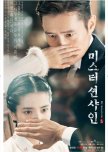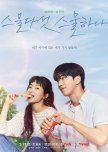
Sweeping Epic
"Mr. Sunshine" is a grand story, taking place in Korea during the 1895-1910 time frame, as the Japanese gradually, and brutally, colonize Korea. We watch as the characters are swept from their old lives into a new, ugly era. It is a heavy story, and (slight spoiler) the ending is true to the that heaviness.What did I like?
The main characters are distinctive with their own internal conflicts. The main character, Eugene Choi, was born in the slave class of Korea; as a child he escaped to the USA, and decades later returned to Korea as an officer in the Marine Corps. Eugene maintains his American identity to the end, but paradoxically falls in love with the aristrocrat-turned-assassin Go Ae Shin. Go Ae Shin is universally respected and cherished, a symbol of what's good in Korea; when she met a boy from a butcher family (a social status similar to Eugene's), that boy, Gu Dong Mae, called her a "spoiled, noble fool", which so haunts her that she eventually joins the anti-Japanese militia. After that encounter Gu Dong Mae had escaped to Japan, where he joins a yakuza-like organization, and then returns to Korea to lead a group of swordsmen who wreak havoc on Korea. Kim Hui Seong also has returned from Japan to his wealthy Korean family, ostensibly to marry his betrothed, Ae Shin, but he struggles with a vague alienation from his social standing. Rounding out the main cast is Kudo Hina, the daughter of a traitorous and powerful Korean official; Hina is a young widow, whose wealthy Japanese husband died under mysterious conditions, leaving Hina enough money to build a large hotel in Hanseong (Seoul).
These characters engage with each other and the contrasts are interesting and entertaining. As their own personal histories become overshadowed by the growing Japanese crisis, for their own reasons they converge, and this convergence (more so than the war itself) is the center of the story. There's some off-beat humor that comes with this convergence (the humor helps to convey the convergence), as these people grow closer even with obvious reasons to not like one another.
The acting is superior. I saw the characters as people. My only concern would be that some of the bad guys were over the top, but the historical record suggests that the actors in some of the villainous roles may have underplayed it a bit.
The cinematography is gorgeous, both inside and out. I have a whole list of locations in South Korea I now want to visit. The production values are high -- obviously I don't know what exactly Hanseong looked like in 1903, but I buy the details that they're presenting.
What did I not like?
The show has action-packed war scenes looming, and yet it's character-driven with gorgeous imagery, which means some folks thought the pace was way too slow. I tend to luxuriate in these scenes, particularly as I need to read the bottom of the screen for the translation of the dialogue, but, yes, the story often drags. Scenes where Eugene and Ai Sin are alone, simply conversing with one another, could be the worst culprits.
In spite of the slow pace and the lengthy close-ups, the character development does have a bit of a hole to it: Why are these three guys so devoted to Ai Sin? She is pretty and passionate and pure of heart, and maybe that's enough. We don't really get significant personal interactions that would show the development of the relationship, and the story felt a bit thin here.
Finally, to reiterate, this is a heavy show. Between episodes, I found myself repeatedly asking "Was it really that bad?" And the answer was generally "Yes, and it's going to get worse." There is no way I could re-watch 35 hours of this any time soon, as entertaining as I thought the series was. In addition to pondering the fates of these characters, I spent so much time thinking about what really happened, and my understanding of the history of that period has gotten darker. Now I need to find some some light-hearted romantic comedy.
Vond je deze recentie nuttig?

Some Good, Some I Don't Understand
Let's do it by the numbers, starting from a baseline of 6.0.+1 because Kim Tae Ri nailed the Na Hee Do character the energy and innocence of youth, along with the various mannerisms of a teenage athlete. I don't how she did it, but she earned some awards for this performance. She made the character a lot of fun.
+1 for the rest of tbe acting cast and characters. There are a couple of jerks in the script but no continuing arcs of bad guys. These are young, mostly likeable young people trying to make tbeir way through life. What conflict that emerges is from reasonable differences in priorities and from social circumstances.
+1 for the relationship between Na Hee Do and Baek Yi Jin, two people who were too young to be so alone like that. They helped each other through some dark times in their youth when nobody else was there for them. We all should have someone like that in our lives. The payphone scene was an effective way to express how important these two were to one another.
+1 for the relationship between Na Hee Do and Ko Yu Rim. A relationship like this between two young women just doesn't seem to happen often in the shows I have watched. This relationship has only the slightest hint of being part of a love triangle, and that hint dissappears quickly enough. The hug in Madrid and Hee Do saying "nobody else knows what we have been through" conveyed the special nature of their connection.
+0.5 for the introduction to fencing, a sport I knew nothing about. I do wish the series had done some more here. In particular I wish there had been some more slow motion shots and better camera angles, because there were a few times where I could not tell what thr heck was going on.
-1 for the framing of the story as primarily a giant flashback from 2022 to 1998-2002. The times play a key role in the relationship between Hee Do and Yi Jin, so i understand why the story would start in 1998, but I don't understand the point of the bits of dialogue that take place in 2022. It feels like the primary purpose was to give us some hints on how the story will turn out, but judging by social media, a LOT of people did not get the hint. Adding the daughter character led to a cute "breaking of the fourth wall" scene but it also led to an obvious but futile question about the daughter's connections with the main narrative. There is another question -- is Hee Do happy in the present day? -- which gets almost completely ignored, which leads to...
-1 for the story gaps. So we get heavily invested in this character Na Hee Do, and we get little hints about her present day life, and, er, that is it. Just felt weird. I don't want to go into spoilers, but there are obvious questions about Mr. Kim that went completely ignored. The bigger gap though is what happens near the end of the main narrative, where the relationship between Hee Do and Yi Jin just... breaks down? Yi Jin made a decision that in some respects is true to his character, but also seems to violate his personal prime directive of not hurting Hee Do. That conflict needed to be presented explicitly on screen, and it wasn't, and a LOT of viewers were frustrated as a result. The other gap is what happened in the later years between Yi Jin and Hee Do; while it is easy to guess, it feels odd that we have to guess given the narrative framing mentioned above.
-0.5 because my wife thought the story didn't seem to have an underlying point. There is some discussion about impermanence and youth, and there is some discussion of "the times", that the forces of history at work on our little lives. But these themes seem to waft in and out rather than driving the story.
I am neutral on the ending. Some people were offended by it, but i thought it felt natural and true to the characters. If you are the type of person who will fall in love with an attractive actor like Nam Joo Hyuk, you will be frustrated with the ending, but I thought the presentation of the character made clear how this story would turn out. As mentioned above, the writing could have been tighter with the resolution, so no positives from me.
One aspect of the series that it is unclear to me is that Hee Do's mom was a well known journalist who completely fails to acknowledge in public that this extremely successful and prominent athlete is her own daughter. This is held out as a basic tenet of professionalism, but it is foreign to me. Is this common among Korean journalists? Or is this woman weird? For that matter, is her successor as UBS news anchor also similarly pathological during an interview with a close friend?
Finally, the idea that the best fencer in the world might be 18 years old and then retired by age 29 (or earlier) puts some additional negative vibes on the ending. The series has some uplifting moments at the start and then... well, we're past our peak at 25. There is a vague sadness around the older Hee Do, that she was done writing "her story" even when she still had more Olympic gold medals ahead of her. That does not seem true to the younger Hee Do, and again I will attribute the inconsistency to the clumsy present day framing.
In summary the plot was good, not great. The characters, their relationships, and the acting carried the series. It is a good watch, but clearly not for everyone. 8.0/10.
Vond je deze recentie nuttig?


